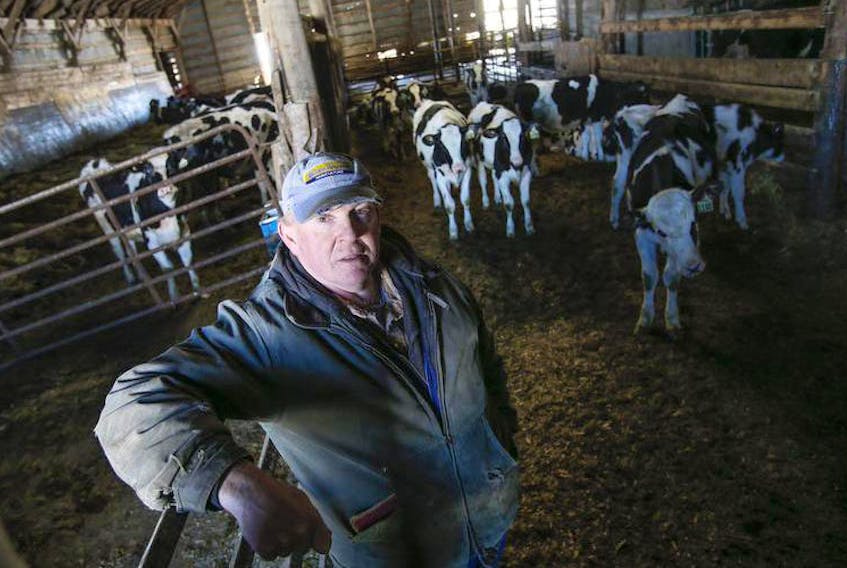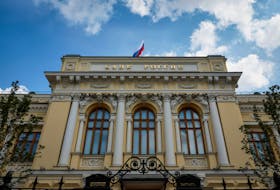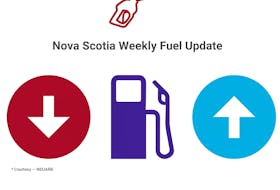It’s a bad day down on the farm.
“It’s going to hurt, again,” dairy farmer Derick Canning of Upper Stewiacke said of the recently struck U.S.-Mexico-Canada Trade Agreement.
“It’s the third deal in the row that we gave up access. We’ve got the only (dairy market) system in the world that works and everybody else in the world wants it gone and our government is yet to take a stand to defend us.”
The tripartate deal that replaces the North American Free Trade Agreement will grant an expanded 3.6 per cent market access to the Canadian dairy market and eliminate competitive dairy classes, which the Dairy Farmers of Canada say will shrink the industry.
“Dairy farmers here are very, very disappointed,” said Brian Cameron, general manager of the Dairy Farmers of Nova Scotia. “The access is a national number, that 3.59 per cent, and it doesn’t really matter whether it comes into B.C. or Ontario, it still affects all producers because we have a national system.”
Both Canning and Cameron said the latest deal comes on the heels of trade agreements with the European Union and the Trans-Pacific Partnership countries that had already created more foreign access to the Canadian dairy market.
“It’s all additive and it’s all perpetural,” Cameron said. “Once you lose the markets, you never get those back. That just means more and more imports each year.”
He said Canadian dairy exports will also be slashed.
“Canada sees itself as an export country and yet this is putting limits on those exports which is a double whammy,” Cameron said.
“We are doing some preliminary estimates and trying to understand the numbers. The federal government is trying to downplay it as not being too significant. It certainly looks like it’s more than the Trans-Pacific Partnership deal and that was $160 million to $170 million lost in revenue once it was fully in place. This could approach $200 million lost to the dairy farmers of the country. And it’s not just the farmers. This reduces the amount of cheese, butter, yogurt, ice cream, dairy products that (domestic) processers need to make to serve Canadians.”
Canning said the deal won’t turn things around in the U.S. industry.
“The access that they’ve gained will do nothing for them,” Canning said. “It hurts us a lot but it’s a drop in the bucket for them.
“I expect the price I get paid for my milk at the farm here to go down, again. We lost 3.6 per cent of our quota again. I expect to feel that. We just had a substantial quota cut here this year already. That affects my bottom line.”
The Canning Farm Ltd., operation milks 115 cows, but Canning said the number of milk cows will have to drop to match any reduced quota.
“We’ll probably have to milk a few less cows. That means less milk and less money.”
He said the cows culled from the milking rotation would probably end up at McDonald’s.
“I say that jokingly but that is pretty much what they’d be used for — hamburger.”
Cameron doesn’t put too much stock in Foreign Affairs Minister Chrystia Freeland’s promise Monday that all farmers in the supply management system will be fairly compensated for the additional market access being given to trading partners in the deal.
“We were asking for no harm to the industry and that isn’t what was delivered,” Cameron said. “One of the things that get talked about is that we can just compensate the dairy industry for those losses. It’s perpetual losses every year, so, how do you do that? The Canadian government came out with a $250-million program to compensate producers’ losses in the European trade deal. The problem is that not all producers were eligible for it and the $250 million covered a half year’s worth of imports and then the money runs out.”
Cameron said there are 210 family dairy farms operating in Nova Scotia, collectively producing about 200 million litres of milk a year. Although that accounts for only 2.2 per cent of national production, it means $145 million at the farm gate in this province, he said.
“That’s what they get paid for their milk. You could probably more than double that when you talk about value added when you put the processing together with it. It would be above $300 million total value of dairy products.”
The U.S. dairy industry is 10 times the size of the Canadian industry, Cameron said.
“U.S. farmers have said that this sort of deal is not going to solve their (over-production) problems south of the border. It is unfortunate that it has been portrayed as maybe it will.”
Cameron said it’s unclear how the extended access is going to play out on the shelves of Canadian grocery stores.
“Sometimes they bring it in for what we call further processes. Examples would be bringing in butter in bulk and then selling it to a cookie-maker here, cheese on Michelina’s meals or pizza. It’s part of a further processed foodstuff versus blocks of cheeses or blocks of butter. We don’t know that yet.”
He does know that local dairy farmers are upset.
“There are some very disgruntled dairy farmers now, understandably, and yet it’s beyond their control. The border controls are federal government and they’ve unfortunately done what they did two times already.”









